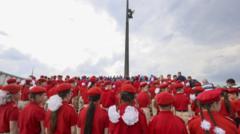In the occupied territories of Ukraine, an alarming campaign is underway to influence the hearts and minds of young children, as Russia seeks to instill a fervid love for its state. From early childhood education settings in Luhansk to organized events celebrating Russian nationality, Ukrainian children are being subtly but systematically conditioned to align with Russian ideology.
At a local nursery in Luhansk, dozens of children can be seen clinging to a lengthy black and orange Russian military banner, reminiscent of the letter Z, emblematic of Russia's ongoing invasion. In another part of the city, a group of young girls gleefully dances to the assertive tune of "I am Russian," vocally affirming their identity with chants designed to fortify their allegiance to Russia.
Compounding these efforts, children in towns such as Anthracite engage in crafts intended for Russian soldiers, seeking to foster a sense of duty and loyalty from a very young age. As many Ukrainian educators have left their posts due to the conflict, Russia is financially luring teachers from its own territories to fill the void, offering significant monetary incentives for those willing to relocate to the occupied regions.
The government-backed Yunarmia, or Youth Army, is at the forefront of this initiative. Founded under the auspices of Russia's defense ministry, it welcomes members from just eight years old. It claims to equip youth with skills that would prove advantageous should they decide to join military service later in life. Fidail Bikbulatov, who oversees Yunarmia's operations in occupied Zaporizhzhia, has been deployed from several regions in Russia and is now central to this indoctrination effort.
International condemnation has been swift, as the EU and UK have placed sanctions on Yunarmia for what they characterize as the "militarization" and "brainwashing" of Ukrainian children. Numerous other organizations established under Kremlin direction also operate in these areas, conducting events steeped in military history while emphasizing loyalty to the Russian state.
One Ukrainian youth, Lisa, recalls being compelled to participate in parades celebrating Russian heritage and curriculum filled with pro-Russian content—stories that belittle Ukraine and celebrate Russia's military endeavors. Forced participation in systematic nationalistic education has left an indelible mark on these vulnerable minds.
Russian soldiers also contribute to this indoctrination through school visits, sharing embellished tales of heroism and praising military actions that paint Ukrainians in a negative light. Historical exhibitions aimed at glorifying Russia's narrative are hosted in occupied areas, often featuring prominent propaganda themes.
Notably, the Kremlin has initiated a campaign to take Ukrainian youth on extensive tours across Russia under program names such as "4+85," purportedly to integrate them into Russian society. The grim reality is that thousands of Ukrainian children have been forcibly removed from their homes without intent of return. Official figures from the Ukrainian government suggest that over 19,000 have been taken, with many sent to "re-education camps."
Such actions violate international humanitarian laws stipulating the rights of occupied individuals and condemning coercive practices. Prominent human rights bodies, including the International Criminal Court, have called out these transgressions, specifically regarding the unlawful deportation of children.
As Russia furthers its war on Ukraine, it is not merely seeking territory; it is striving to exert control over the very identity of young Ukrainians. The struggle for Ukraine's sovereignty extends beyond the battlefield to the very foundations of its future generations.



















